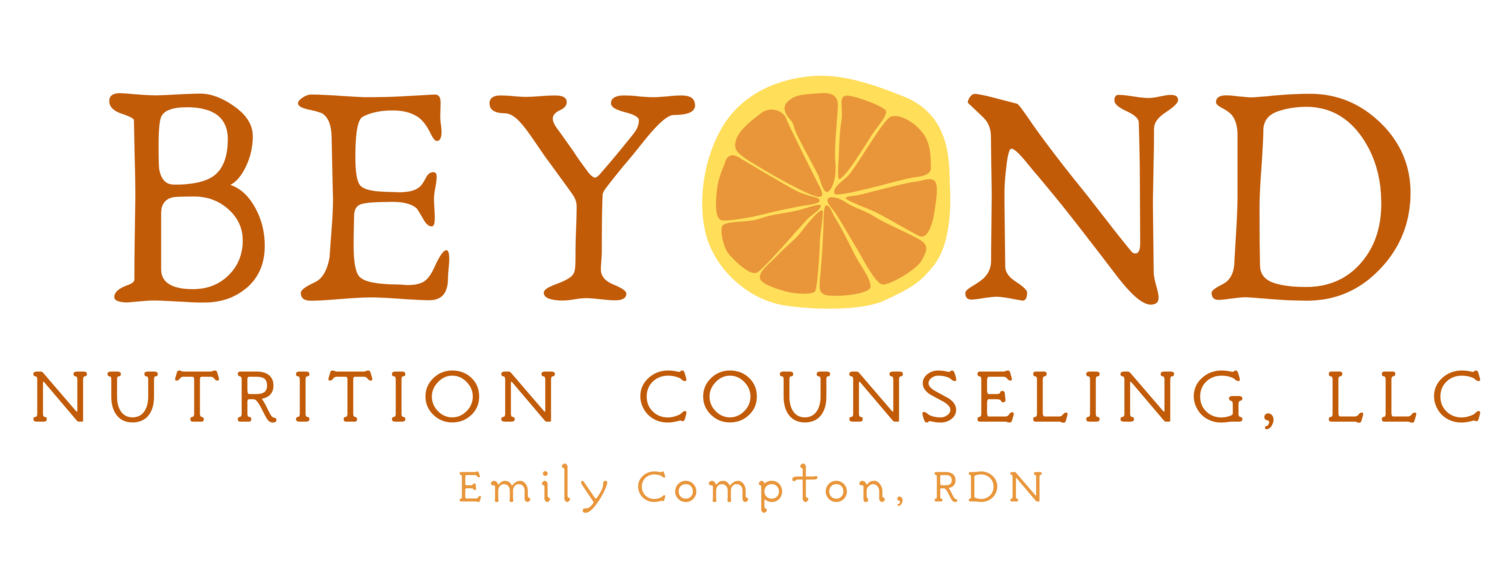Holidays- Hell or Hallelujah?
Turkey, gravy, mashed potatoes, butter, holiday cookies, brie and jam, oh my! To some, holiday foods sound nothing short of heavenly. To others, holiday foods feel scary and stressful. Maybe you’re caught in between.
How can we frame our minds around the upcoming holidays? How do we know when and how much to eat? Here are some ideas to help get you in the holiday spirit (at least when it comes to food and eating!).
Recognize it as a season
First of all, let’s recognize the holiday season for what it is- a season. This means that it too shall pass, along with its specialty foods. Just as in the spring we think of fresh strawberries, in the summer we’re in popsicle paradise, and in the fall we’re back to pumpkin and apples; Thanksgiving, Hanukkah, Christmas, New Years, and other winter holidays will come and go. We won’t have access to pumpkin pie all year round, so enjoy it while we have it. This also means allowing ourselves to engage with some of these special foods throughout the month and a half holiday block, not just the day of the holiday itself.
Give yourself permission to eat all kinds of foods
What do I mean by “give yourself permission”? It’s exactly that- allowing yourself to have the pumpkin pie with whipped cream, and without guilt. Don’t feel bad about it! You are a human and you are allowed to eat foods that give you pleasure- it’s actually how we have continued to survive. When we allow ourselves to have these foods we take away their power. Have you ever noticed when you want something but won’t let yourself eat it, you want it more? By allowing ourselves to eat the food and enjoy it guilt free, that craving will typically fade away. Now, please note if this food is something you really like and haven’t allowed yourself to have in a long time, you may feel excited about it or crave it more than once, it may be many times before you start to feel “bored” of it, but ride it out and trust yourself and the process. If you feel you’d like help with these ideas, contact a local eating disorder registered dietitian.
Continue to feed your body and soul
Foods that are body nourishing are typically higher in vitamins, minerals, fiber, maybe protein. Foods that fuel the soul are foods that mean something to you, foods that you really like, are especially delicious, or foods that you have memories about, even if they may not traditionally be considered “nutrient dense”. Yes, soul nourishing foods may not have a lot of vitamins, but they are not meaningless and they are not wasteful. They still fuel our bodies, likely with carbohydrates, and they are enjoyable to eat.
All that to introduce the concept that our bodies need both- they need foods that are high in vitamins, minerals, carbs, fats, proteins, fibers, and water. So get it all in- the salads, the cookies, the turkey, the quinoa, your body needs it all!
Overeating is common
… and it doesn’t make you a bad person. Holidays are exciting! You may have family or friends around, music or games going, or any mixture of fun things. The food makes it fun too! There is also usually some pressure and/or business surrounding the Big Holiday meal that people may forget to eat during the day leading up to the meal. This can cause extreme hunger! Excitement, new and special foods, and the possibility of extreme hunger can certainly lead to over-eating. But this does not make you a bad person- it is very common to overeat at Thanksgiving or other meals. If you are worried about overeating during the holiday meal, make sure you give yourself proper nutrition during the day. Eat breakfast, lunch and maybe some snacks too, before the big meal. Our bodies need fuel every day, throughout the day.
Getting Back on Track
I don’t mean dieting! You do not need to “be good” after a holiday- in fact, don’t even utter those words. Getting back on track here means continuing to nourish yourself if you feel ashamed that you may have overeaten. Many people may feel the urge to restrict their intake the next day to “make up for” what they ate the day before. But please do not do this. We know that restricting only leads to binging later, so keep nourishing your body the following days after holiday eating. If you’re on a meal plan this means, continue to follow your meal plan.
Set up boundaries and plan
It’s a good idea to set up boundaries for yourself. If you have a trusted loved one you can recruit as an ally, do it! There are lots of tricky moments and triggering conversations that can come up during the holidays. Think through what might be hard for you and have a conversation with your ally, or even to yourself, to practice what you might say if something comes up. Boundaries that might be helpful for you are not talking about diets, weight loss/gain, or shaming ingredients with relatives. You yourself or an ally can help share that these topics are off-limits for you.
Similarly, it can be helpful to have a plan. What kind of plan? All sorts of plans- a plan to de-stress if someone is making you anxious, a plan for what you will eat at someone's house or at a restaurant, a plan for when you will eat a snack if you have to drive a ways to a celebration, etc.
I hope this helps frame holidays as a fun time of celebrating, with food, loved ones and other activities. If you find any of these topics especially difficult, reach out to a therapist and a dietitian.
Emily Compton, MPH, RDN
Owner of Beyond Nutrition Counseling LLC

